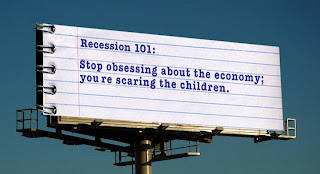
Of all the factors that might correlate with overconfident investment in financial markets (age, marital status, socioeconomic upbringing, education) the most obvious factor is simple, small, and impossible to control. It's the Y chromosome. At least that's what behavioral finance economists Brad Barber and Terrance Odean demonstrated in 2001 with their study on "gender, overconfidence, and common stock investment" ("Boys Will Be Boys.")
For years, macho bravado in this country has been artificially supported - subsidized, you could say - by U.S. economic policy. As Reihan Salam notes in "The Death of Macho," the now-popped housing bubble translated during its apex into bubbles of construction jobs - and with them unrealistic, unsustainable job security and pay for the over ten million men employed by that industry. The boom in the housing market also meant inflated income in sectors like cement production, truck transport, and architecture - also male dominated fields.
And now, accordingly, the recession is having its greatest effect on men. More than 80 percent of job losses in the United States since November have fallen on men, according to the U.S. Bureau of Labor Statistics. All told, by the end of 2009, the global recession is expected to put as many as 28 million men out of work worldwide, projects Salam.
But subsidized machismo goes all the way back to the New Deal, when a huge effort was made to revive the figurehead of the male breadwinner, who had been kicked in the balls by the Depression. This effort was made at the general expense of women, who were sent to the kitchen and expected to be happy with the "economic security" provided by their government-employed husbands. Essentially, as historian Stephanie Coontz writes in her book, The Way We Never Were, women were promised economic security in exchange for the state’s entrenchment of male economic power.
Well, the false sense of security generated by all that contrived support for the male ego backfired, as now men are not only unemployed (again) but also undereducated (statistics indicate that soon there will be three female college graduates for every two male graduates in the United States) and psychologically ill-equipped to deal with unemployment.
So the US can expect to see a whole bunch of bummed-out bros in the years to come. But to what effect? Well, an increase in rates of heavy drinking, for one, says Social Science & Medicine magazine, and also decreased rates of marriage, which has been found by Economist Eric D. Gould to be a factor that correlates with both economic and educational achievement in men.
So as the Recession barrels on, slapping everyone it meets with a nice fat reality check, the “macho” man can choose to adapt or to resist, to evolve or to be left behind and rendered historically obsolete. The choices men make may divide them geographically or culturally, by religion or by class. Only time will tell, and we can only hope that more dudes than not choose to embrace the death of macho.
 The marketing campaign for Mars' new candy bar, 'The Fling' eagerly takes the advertising maxim "sex sells" to a whole new level of obvious. And, frankly, it's creepy.
The marketing campaign for Mars' new candy bar, 'The Fling' eagerly takes the advertising maxim "sex sells" to a whole new level of obvious. And, frankly, it's creepy. referred to as a "finger," and the candy's motto declares that 'The Fling' is "naughty, but not that naughty" (another attention grabber: "pleasure yourself with a chocolate finger.")
referred to as a "finger," and the candy's motto declares that 'The Fling' is "naughty, but not that naughty" (another attention grabber: "pleasure yourself with a chocolate finger.")




